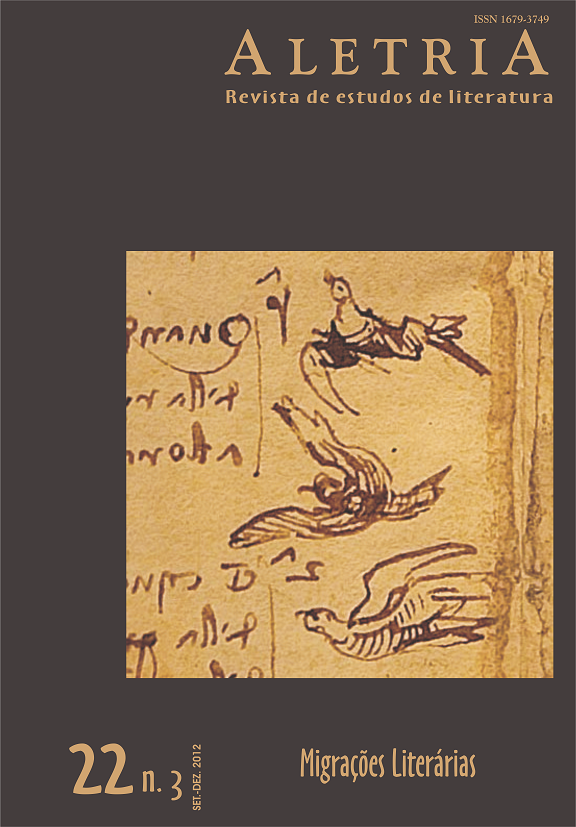Senes Sapientes, senhores fundiários, intendentes e trabalhadores nos campos romanos
DOI:
https://doi.org/10.17851/2317-2096.22.3.265-278Palabras clave:
literatura agrária romana, Cato Maior, De re rusticaResumen
Neste artigo, discutimos o tema dos atuantes na vida rural antiga tal qual descrita no Cato Maior, de Cícero, e no primeiro livro do De re rustica, de Varrão. Personagens como aquelas dos escravos, do senhor, do uillicus, dos trabalhadores livres (em suas terras ou nas terras alheias) e do velho “agricultor”, conforme lemos no pequeno diálogo de Cícero, não participam igualmente quando consideramos as duas obras em conjunto. Cícero preferiu idealizar, concentrando suas descrições no idoso sábio nos campos (cujo modelo é Catão, o Velho), enquanto Varrão escolheu a via da documentação histórica, como convém a um texto que se identifica com o grupo dos escritos técnicos em Roma antiga.
Descargas
Citas
BOSCHERINI, S. Considerazioni sulla “laus Italiae” di Varrone. In. BOSCHERINI, S. Studi in Onore di Adelmo Barigazzi. Roma: Edizioni dell’Ateneo, 1986. v. I. p. 101-109.
CARDAUNS, B. Marcus Terentius Varro. Einführung in sein Werk. Heidelberg: Universitätsverlag C. Winter, 2001.
CATON. De l’agriculture. Texte établi, traduit et commenté par Raoul Goujard. Paris: Les Belles Lettres, 1975.
CICERO. Cato Maior de Senectute. Edited with introduction and commentary by J. G. F. Powell. Cambridge: University Press, 2004.
CICERO. De la vieillesse. Texte établi et traduit par P. Wuilleumier. Paris: Les Belles Lettres, 2003.
CORNELIO NEPOTE. Gli uomini illustri. A cura di Luca Canali. Milano: Oscar Mondadori, 2002.
FILOCHE, C. Les comiques dans l’intertexte des “Bucoliques”. In: FILOCHE, C. (Dir.). L’intertexte virgilien et sa réception. Dijon: Université de Bourgogne, 2007. p. 57-85.
GRIMAL, P. Virgílio, ou o segundo nascimento de Roma. Trad. Ivone Castilho Benedetti. São Paulo: Martins Fontes, 1992.
HEURGON, J. Introduction. In: VARRON. Économie rurale. Livre I. Texte établi, traduit et commenté par J. Heurgon. Paris: Les Belles Lettres, 2003. v. I. p. VII-LXXXV.
KOLENDO, J. Il contadino. In: GIARDINA, A. (A cura di.). L’uomo romano. Roma/ Bari: Laterza, 1993. p. 217-232.
KOLENDO, J. Le vocabulaire concernant la main d’œuvre dans les traités de Caton, des Saserna et de Varron. In: BIEZUNSKA-MALOWIST, I.; KOLENDO, J. (Dir.). Actes du colloque sur l’esclavage. Wydawnictwa Uniwersytetu Warszawskiego, 1979. p. 197-215.
MARCONE, A. Storia dell’agricoltura romana. Roma: Nuova Italia Scientifica, 1997.
MARMORALE, E. Cato Maior. 2. ed. Bari: Laterza & Figli, 1949.
MARÓTI, E. The vilicus and the villa-system in ancient Italy. In: HAHN, I. et al. (Ed.). Oikumene. Budapest: Akadémiai Kiadó, 1976. p. 109-124.
MARTIN, R. La vie sexuelle des esclaves, d’après les dialogues rustiques de Varron. In: COLLART, J. (Dir.). Varron: grammaire antique et stylistique latine. Paris: Les Belles Lettres, 1978. p. 113-126.
MARTIN, R. Recherches sur les agronomes latins et leurs conceptions économiques et sociales. Paris: Les Belles Lettres, 1971.
MULLER, P. Cicéron. Un philosophe pour notre temps. Lausanne: L’Âge d’Homme, 1993.
NARDUCCI, E. Introduzione a Cicerone. Roma/Bari: Laterza, 2005.
PARKIN, T. G. Old age in the Roman world. Baltimore: The Johns Hopkins University Press, 2003.
RIPOSATI, B. Varrone e Cicerone maestri di umanità. Aevum, Milano, anno XXIII, fasc. 1-2, p. 246-266, 1949.
ROBERT, J.-N. Caton ou le citoyen. Paris: Les Belles Lettres, 2002.
ROBERT, J.-N. La vie à la campagne dans l’antiquité romaine. Paris: Les Belles Lettres, 1985.
ROBERT, J.-N. Rome. Paris: Les Belles Lettres, 1999.
SARAIVA, F. R. S. Novíssimo dicionário latino-português. Rio de Janeiro: Livraria Garnier, 1993.
SIRAGO, V. Storia agraria romana. I - Fase ascensionale. Napoli: Liguori, 1995.
SKYDSGAARD, J. E. Varro the scholar. Studies in the first book of Varro’s De re rustica. Copenhagen: Einar Munksgaard, 1968.
TREVIZAM, Matheus. A face gramatical de Varrão em “De re rustica” II. Aletria. Belo Horizonte, v. 19, n. 3, p. 89-101, jul./dez. 2009.
TREVIZAM, Matheus. Linguagem e interpretação na literatura agrária latina. Tese de doutoramento inédita. Campinas: IEL-Unicamp, 2006.
VARRON. Économie rurale. Livre I. Texte établi, traduit et commenté par J. Heurgon. Paris: Les Belles Lettres, 2003.
VIRGILE. Géorgiques. Texte traduit par E. de Saint-Denis. Introduction, notes et postface de J. Pigeaud. Paris: Les Belles Lettres, 1998.
XENOFONTE. Econômico. Trad. Anna Lia A. de Almeida Prado. São Paulo: Martins Fontes, 1999.
Descargas
Publicado
Cómo citar
Número
Sección
Licencia
Derechos de autor 2012 Matheus Trevizam (Autor)

Esta obra está bajo una licencia internacional Creative Commons Atribución 4.0.
Authors who publish with this journal agree to the following terms:Authors retain copyright and grant the journal right of first publication with the work simultaneously licensed under a Creative Commons Attribution Non-Commercial No Derivatives License that allows others to share the work with an acknowledgement of the work's authorship and initial publication in this journal.Authors are able to enter into separate, additional contractual arrangements for the non-exclusive distribution of the journal's published version of the work (e.g., post it to an institutional repository or publish it in a book), with an acknowledgement of its initial publication in this journal.Authors are permitted and encouraged to post their work online (e.g., in institutional repositories or on their website) prior to and during the submission process, as it can lead to productive exchanges, as well as earlier and greater citation of published work (See The Effect of Open Access).





